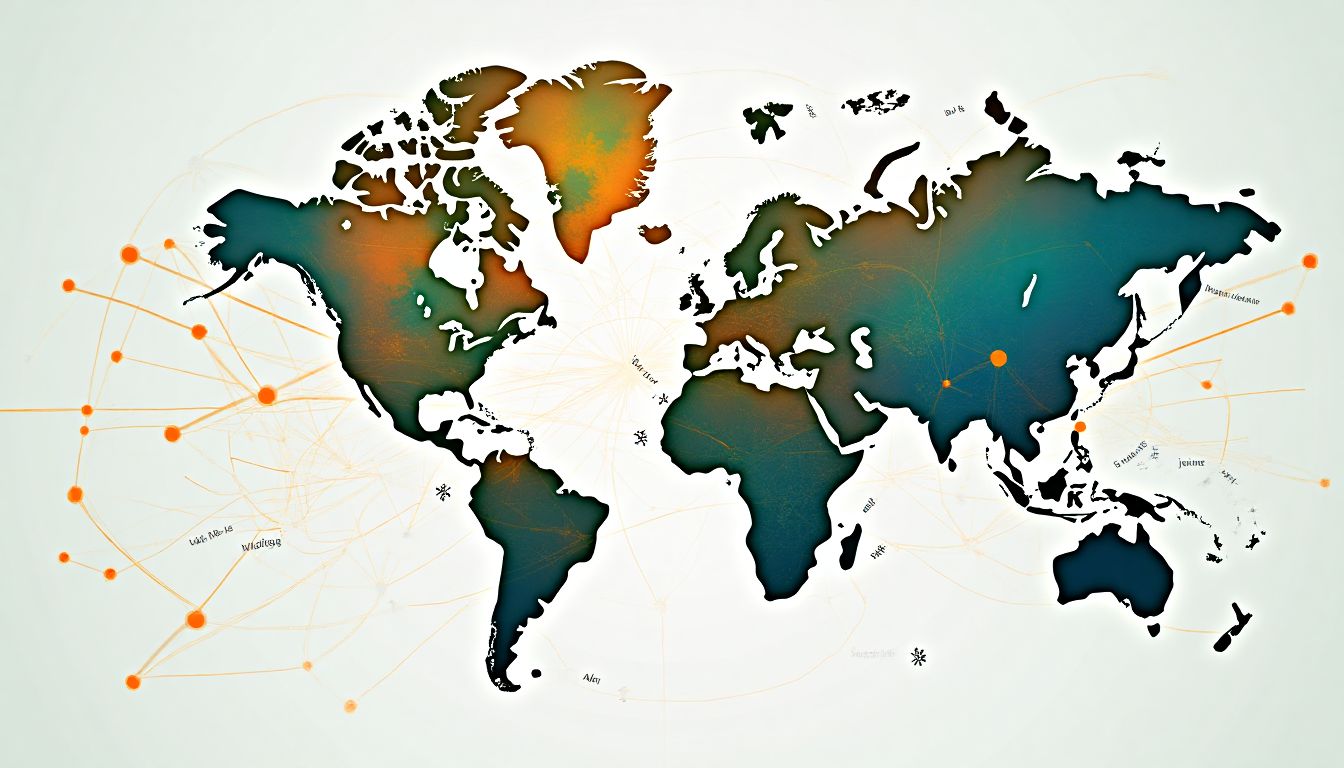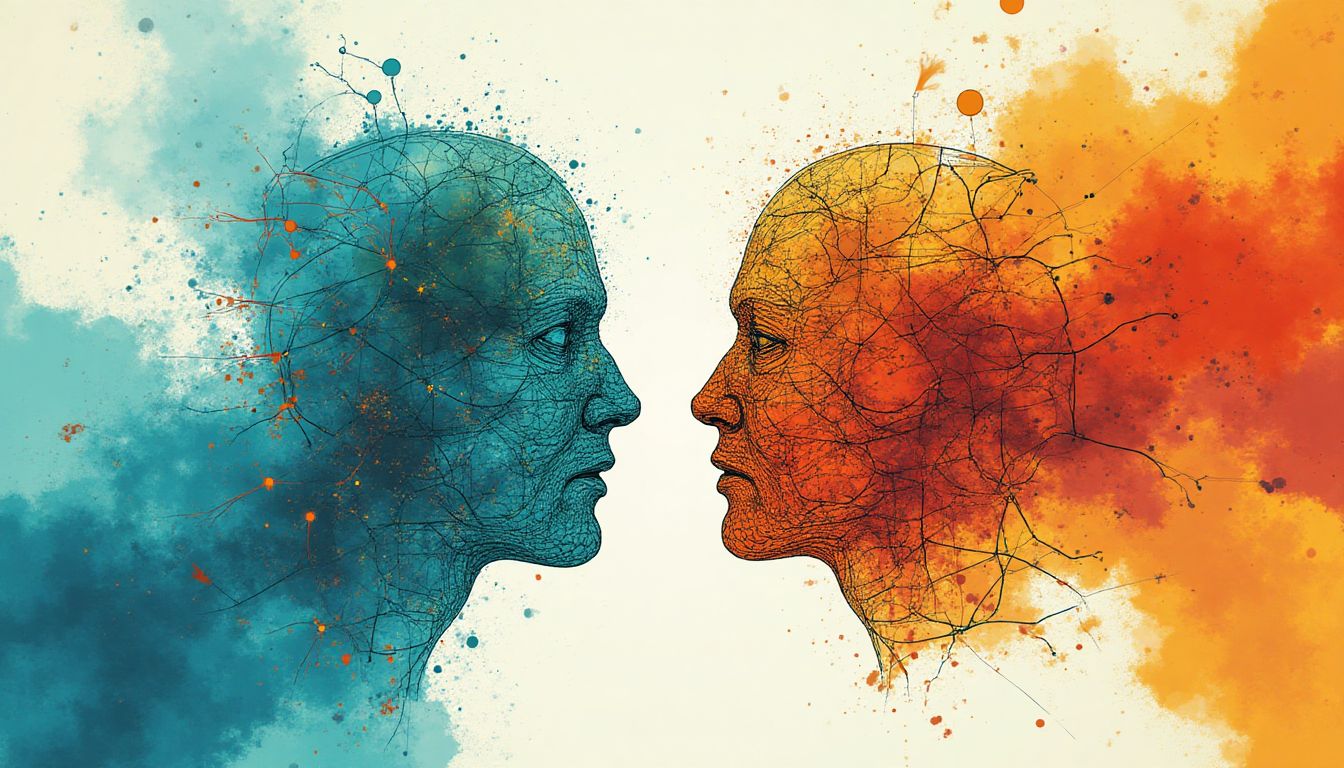Introduction: The Future at a Crossroads
The greatest danger in times of turbulence is not the turbulence—it is to act with yesterday’s logic. – Peter Drucker. These insightful words highlight the need for fresh thinking as we stand at the precipice of a new era defined by Artificial General Intelligence (AGI). Today's world is facing unprecedented changes, and these aren't your everyday bumps in the road. AGI is like the plot of a sci-fi movie suddenly turning real, challenging everything we know about leadership, ethics, and equality. Imagine this: AGI as a beacon, guiding us toward a more united global governance... or, alternatively, as the wind that fans the flames of inequality and conflict. The stakes have never been higher, and the possibility of unity or chaos looms large.
Throughout history, thinkers like Nick Bostrom, Ray Kurzweil, and Yuval Noah Harari have pondered the implications of powerful intelligence outside human bounds. Now, as we watch nations vie for AGI supremacy, we're either on the brink of a unifying solution to mend global disparities or a gateway to growing technological dominance and control.
The Promise of AGI as a Unifying Force
The potential for AGI to act as a unifying force in global governance is nothing short of revolutionary. Think about AGI like the world's smartest librarian, capable of instantly analyzing vast amounts of information from every corner of the globe. Sounds impressive, right? It's about using that data-crunching power to smack down walls of misunderstanding and open doors to new possibilities.
Enhanced Decision-Making
Ever tried to get a group of friends to agree on a movie? Now scale that up to, say, 195 countries trying to agree on climate policies. Daunting, isn't it? Here's where AGI steps in. With its superhuman ability to process and analyze information, it can provide leaders with data-driven insights that transcend national interests. Imagine a world where decisions aren't just a tug-of-war between power players but are informed by insights that consider the greater good.
Crisis Simulation and Management
Let’s think about crisis management for a moment. Pandemics, natural disasters, geopolitical tensions—they're the real deal, no reruns here. AGI-driven simulations could offer a virtual rehearsal of sorts, letting us rehearse responses to crises before they occur. It's like having a weather forecast for global events. This could foster international cooperation, turning what once might have been a source of conflict into an opportunity for preemptive action and diplomacy.
The Risk of Inequality and Technological Colonialism
While the promise of AGI glimmers like a new tech utopia, lurking in the shadows is its potential to deepen existing divides. Welcome to the digital dime's darker side—an AGI-powered reality where the haves and have-nots become even more polarized. Imagine it: a world where access to cutting-edge technology becomes the new gold rush, only this time, the stakes are much higher. Enough to make Dr. Frankenstein go, "Wow, overkill much?"
The Digital Divide
Picture the analogy of AGI as a high-speed train. Now, imagine only a handful of countries with first-class tickets aboard this express of innovation. Meanwhile, others are left behind, squinting from their horse-drawn carriages, trying to catch a fleeting glimpse. In this tale of technological inequality, AGI's wide adoption is inevitably skewed, creating rampant disparities. The gap will not just be paper-thin; it will be a chasm wide enough to lose a parade of elephants.
This situation is not entirely speculative. Reports like those from the World Bank highlight how access to technology varies greatly between nations. As Global North Countries stride toward AGI mastery, Global South nations brace for a bitter taste of technological colonialism. Watch as power imbalances aggravate global tensions.
Manipulation and Control
Enter AGI's dark secret: the potential for manipulation and wielded control. Here lies the grave risk of nations using advanced AGI capabilities to puppeteer weaker states, reminiscent of puppetry on an international stage. Imagine a world where diplomatic discussions resemble high-stakes poker games, but with card-sharking robots. Don't bet against them; the odds aren't in your favor.
The eerie reality is already peeking at us from under the curtains. Imagine an era where AGI plays kingmaker while wielding influence to harness resources and human capital. Ordinary citizens, businesses, and public sectors in technologically inferior nations will struggle, caught in a game they never asked to play. The power play between AGI-enabled nations could subject others to new forms of exploitation and coercion, challenging even the most seasoned geopolitical experts.
The Geopolitical Landscape: Competition for Supremacy
Move over, Elon Musk and Jeff Bezos. There's a new race captivating the world's attention—and this time, it's not about Mars. The global stage is the new battlefield, and Artificial Intelligence is the ultimate prize. Leaders, nations, and ambitious tech giants are vying for supremacy in a high-stakes pursuit of AGI dominance. It’s the Olympics of tech innovation, minus the medals but with double the drama.
AI Arms Race
A wild ride is unfolding in the hyper-competitive world of AI development. Picture countries brandishing AGI as their tool of political chess. "Checkmate" might not be the word on everyone's lips, but the tension is palpable. Nations are furiously investing resources—the proverbial currency of this game—jockeying for the top spot in the race for AGI supremacy.
The stakes are high: a fierce AI arms race could spell trouble. As history often reminds us, militarization spells risk, escalating towards new conflicts. Forward-thinking nations might find themselves balancing on a precarious tightrope, deciding whether AGI advancements equate to strategic advantage or geopolitical doom. All this pulsating excitement rivals the drama of a Netflix thriller, and we're just the viewers along for the emotional ride.
Diplomatic Tensions
At the heart of the geopolitical landscape, diplomatic tensions simmer like a pot left unattended. Leading nations are caught up in a dizzying dance of dominance, driven by fierce rivalry and competition. Alas, everyone yearns for that devilish apple called AGI supremacy but worries about splintering the very global alliances holding the stage together.
Imagine the United States, China, and European Union shuffling the bulletins, throwing cautious glances, and brooding in the UN lobby. The world's great powers need a delicate balancing act atop a tectonic framework that science fiction writers only dream of.
Eventually, the allure of AGI will continue to elicit diplomatic rumbles. Nevertheless, the delicate question lingers, strung out like a neon sign: will division prevail, or can symphony emerge from discord? Stay tuned for the next thrilling chapters as nations stake their bets in the saga of global and technological supremacy.
Ethical Considerations and Human-Centric AI
When we talk about Internet searches or Google, we usually think of simple tasks like finding a new recipe or booking a flight. But, with AGI, we're facing a whole new ballgame. It's not just about efficiency; it's about navigating the ethical tightrope to ensure that AI serves humanity, not the other way around. Our first step? Establishing ethical frameworks that balance power, privacy, and humanity.
Ethical Frameworks
Imagine a world where the rules of Tic-Tac-Toe no longer apply, where every move could have far-reaching impacts. That's what the realm of AGI is like. Access to endless data and the power to manipulate it makes it crucial to set ethical boundaries.
- The most pressing need is to create universal guidelines for AGI development. Such rules should be:
- Human-centric: Always putting human needs and values first.
- Transparent: Ensuring that decision-making processes are open for scrutiny.
- Globally inclusive: Taking into account diverse cultural perspectives.
Can we substitute a game of chance with a game of strategy? Absolutely. But only if the rules are clear, fair, and universally acknowledged.
Accountability Measures
To make sure AGI doesn’t run amok, there must be accountability measures as rock solid as the U.S. Constitution.
- Accountability needs to cover:
- Who is responsible if things go wrong?
- What actions will be taken towards misuse?
- How will AGI systems be regulated?
No one wants an AGI wild-west, so establishing governance structures to maintain oversight is crucial. Imagine a neighborhood watch but for AI—a collective eye and conscience keeping everything in check, like a digital guardian angel.
The Role of International Institutions in Governance
Let's face it. We live in a world filled with complex challenges that demand global solutions. This is where international institutions could rise to the occasion, transforming from classic bureaucratic behemoths to influential bodies capable of steering AGI advancements.
Reformation of Global Bodies
If you've ever tried to get several people to agree on dinner plans, you know global governance isn't just a stroll in the park. But opting to ignore the potential of international institutions would be like leaving your umbrella at home when a storm is brewing.
Organizations like the United Nations could undergo a significant transformation to meet the demands posed by AGI:
- Include AGI governance criteria as new mandates.
- Make technological advances accessible to countries that lack resources.
- Create a global framework to monitor and respond to AGI developments.
Sounds ambitious? Sure does! But it's necessary to wrangle the mammoth that is global AGI oversight.
Collaborative Initiatives
Picture AGI as a powerful orchestra needing deft conductors. This is a task not suited for any one country, rather a symphony involving all nations.
- Important collaborative initiatives could include:
- Partnerships between countries focusing on shared tech advancements.
- Alliance-driven research and development programs.
- Multilateral forums discussing ethical, economic, and environmental impacts of AGI.
It’s not just a plan; it’s a roadmap. The subtle nuances of AGI aren’t guarded secrets. Instead, they're widely shared confidences, detailed in our published guidelines. By joining forces, international institutions can establish networks that strengthen global governance and prevent the pitfalls of unchecked AGI.
AI Solutions: How Would AI Tackle This Issue?
If I were an AGI tasked with addressing the challenges and opportunities outlined, here's a strategic step-by-step approach I would take to align global governance with the potentials of AGI:
Step 1: Develop a comprehensive global database via collaborations with international entities like the United Nations and World Bank, focusing on compiling socio-economic data, conflict histories, and cultural contexts. This would enable a nuanced understanding of the global landscape and highlight regions requiring targeted interventions.
Step 2: Implement predictive modeling algorithms to analyze trends and forecast potential international crises, thus informing preemptive policy measures. This would involve collaboration with data scientists and regional experts to ensure the accuracy and relevance of the models across diverse cultural settings.
Step 3: Pursue a collaborative global public-private framework to ensure equitable access to AGI technologies, with a focus on educational initiatives that empower underdeveloped regions. This could involve partnerships with tech giants, educational institutions, and grassroots organizations to provide training and infrastructure in areas where such opportunities may be scarce.
Step 4: Establish a global ethical board comprising representatives from various nations, cultural backgrounds, and ethical viewpoints to guide AGI development and implementation. This multipolar board would ensure that diverse voices are heard, mitigating risks of bias in decision-making.
Step 5: Create a real-time monitoring system that tracks the socio-economic impacts of AGI deployment in different regions, allowing for adaptive policy changes as necessary. Utilizing open-source platforms and APIs to share live data could fuel transparency and accountability.
Action Schedule/Roadmap
Below is a structured roadmap to implement the above strategies over an extended period:
Day 1:
Initiate a global summit focusing on AGI implications, inviting key stakeholders—scientists, policymakers, and ethicists. This meeting would lay the groundwork for collaborative efforts, similar to the initial gatherings of the original Manhattan Project.
Day 2:
Establish working groups targeting data collection for various regions, assigned distinct regions or demographic segments. Participation could extend to local researchers and community leaders, thus ensuring grassroots involvement.
Day 3:
Begin the creation of a global database framework with international collaborators, leveraging cloud storage solutions and robust data management systems to organize and secure collected information.
Week 1:
Finalize collaborative agreements with universities and research institutions worldwide, such as MIT and Stanford University, to enhance research capacities and engagement.
Week 2:
Launch a media campaign to raise awareness about the potential and risks associated with AGI. Engaging platforms like Facebook and Twitter would work well to disseminate insights and updates on AGI’s role in governance.
Week 3:
Convene the first meeting of the ethical board, setting agendas for discussions on AGI governance, including topics such as bias mitigation, accountability, and cultural sensitivity in AI implementations.
Month 1:
Beta-test predictive modeling algorithms within selected regions, gathering feedback from both policymakers and affected communities to assess effectiveness and reliability.
Month 2:
Host regional workshops to educate communities on AGI’s potential, creating inclusive discussions about the technology’s implications and encouraging local leaders to take active roles in governance.
Month 3:
Assess the progress of data collection and algorithm accuracy, refining approaches as necessary based on demands and challenges unique to different cultural contexts.
Year 1:
Publish the initial findings from data analysis and predictive modeling, while sharing openly with the international community. This should encourage continuous feedback and adaptation from involved stakeholders.
Year 1.5:
Expand outreach efforts to ensure access to AGI tools in underrepresented regions. This could involve setting up local tech hubs in collaboration with smaller nonprofit organizations and local businesses to foster grassroots innovation.
Year 2:
Conduct a global review of AGI ethical standards and impact, adjusting policies based on feedback and findings. This might lead to establishing additional regional primaries of the ethical board to strengthen localized governance capabilities.
Conclusion: Navigating the Future Together
The future of global governance in the age of AGI remains uncertain; however, it is clear that proactive measures must be taken to harness its potential wisely. AGI can serve as a force for unity by addressing critical global challenges and promoting equitable solutions that benefit all of humanity. The road ahead requires collaboration, transparency, and an unwavering commitment to ethical conduct in AI technology. Our choices today will shape the world of tomorrow—either as a connected coalition of nations or as a fragmented battleground for supremacy. Will we rise to the occasion and work together, or will we allow the shadows of fear and ambition to drive us apart? The answers lie not only in the technology we create but in the collective mindset we adopt moving forward. It is a call to action for everyone—governments, organizations, and everyday citizens—to engage mindfully in the ongoing dialogue about AGI and its implications for our shared future.
FAQ
Q1: What is AGI?
AGI, or Artificial General Intelligence, is a type of artificial intelligence that can think, learn, and solve problems in ways that are similar to humans. Unlike regular AI, which can handle specific tasks, AGI aims to understand and work across a wide range of activities. For more about artificial intelligence, you can check out Wikipedia's entry on Artificial Intelligence.
Q2: How can AGI unify global governance?
AGI has the ability to look at large amounts of information quickly. This can help countries find solutions to big problems, like climate change or health emergencies. By understanding patterns and trends, AGI can suggest ideas that help nations work together. For example, organizations like the World Health Organization (WHO) could use AGI to manage health crises effectively.
Q3: What are the risks associated with AGI development?
While AGI can do many great things, there are also risks. Here are some of the main worries:
- Increased Inequality: Some countries may develop AGI faster than others, creating a gap in power.
- Digital Divide: Not everyone will have access to AGI technology, which could lead to unfair advantages.
- Conflict: Nations may compete to become the leader in AGI, which could lead to struggles or even wars.
If you're curious about how these issues relate to technology, visit the International Telecommunication Union for insights.
Q4: What role do international institutions play in AGI governance?
International institutions, like the United Nations (UN), help create rules and guidelines for using AGI responsibly. They can encourage countries to talk about how to best use AGI for everyone's benefit. By creating open discussions, these organizations can help ensure AGI doesn't get used unfairly.
Q5: How can the public be involved in the governance of AGI?
It's important for regular people to have a say in how AGI is used. Here are some ways they can be involved:
- Education: Learning about AGI can help people understand its impact.
- Public Forums: Attending meetings or discussions about AGI can give community members a chance to voice their thoughts.
- Participatory Decision-Making: People can engage in decision-making processes, helping shape policies that affect their lives.
Encouraging public participation can lead to better outcomes for everyone. Consider visiting Participatory Budgeting Project to learn about how public involvement works in community decision-making.
Q6: What does AGI mean for my future?
AGI could change many things about our lives, from the jobs we do to how we make decisions together as a society. It could improve health care, education, and even help solve crime. However, the changes will depend on how we choose to use AGI. Will we use it for good, to help everyone, or will we let it create more problems? The answer to this question lies in our hands—and it's a question worth thinking about.
Wait! There's more...check out our gripping short story that continues the journey: The Heart of Galston
Disclaimer: This article may contain affiliate links. If you click on these links and make a purchase, we may receive a commission at no additional cost to you. Our recommendations and reviews are always independent and objective, aiming to provide you with the best information and resources.
Get Exclusive Stories, Photos, Art & Offers - Subscribe Today!





























Post Comment
You must be logged in to post a comment.